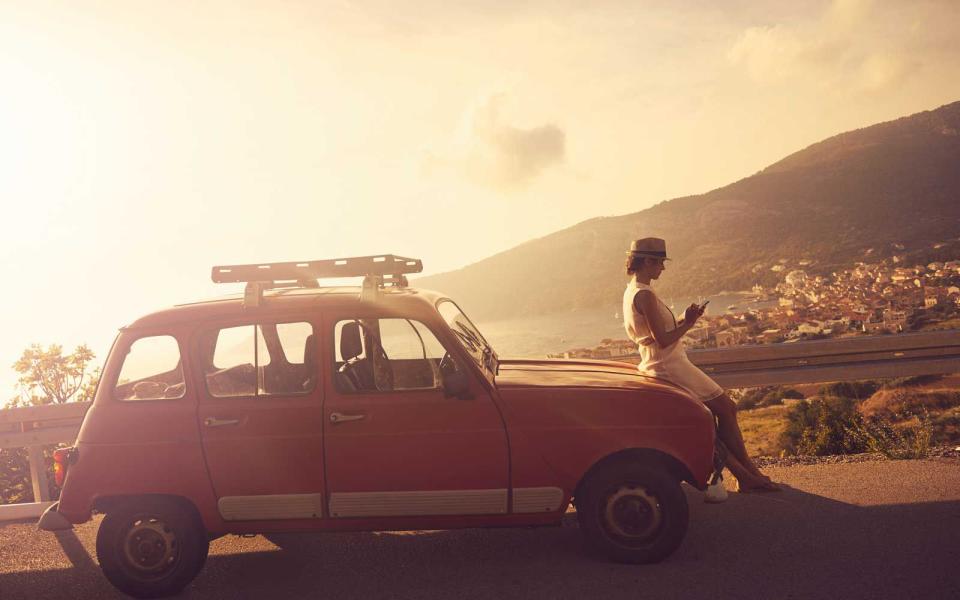7 Road Trip Hacks Every Traveler Should Know
A bumper-to-bumper guide to your next summer adventure.

There's nothing worse than setting off for a road trip and then realizing you've left something at home or discovering that your key fob battery has died while halfway to your destination. To avoid unnecessary pit stops and headaches, check this list of road trip hacks before getting behind the wheel.
Prepare your vehicle for long-distance travel.
According to the American Automobile Association (AAA), most breakdowns can be prevented by having your car serviced before your journey. Head to a mechanic at least a week in advance of your road trip to have the oil and tire pressure checked and ensure that the battery, brakes, and engine are working properly.
While a growing number of new cars come with inflation kits, most still don't have spare tires, including rental cars. If you have a run-flat or doughnut tire, remember that those are intended for short-term use until the flat tire can be fully repaired or replaced. Consider investing in a spare-tire kit, which includes a tire, jack, and lug wrench, for $150 to $300.
You should also consider bringing an extra battery for your key fob. "You'd be surprised at how many car keys die when people are on the road, leaving them locked out of their cars," says an AAA spokesperson.
Before hitting the road, pack an emergency kit that has distilled water, a battery charger, a first-aid kit, jumper cables, and flares or reflectors. Learn how to use the jumper cables (there are YouTube tutorials) before getting on the road.
Pack strategically.
Packing and repacking your car can be time-consuming. Road trip expert Tamela Rich, the author of three books, advises loading nonessential items first, such as anything you won't need until your reach your final destination, and then putting in the items that you'll rely on throughout the drive, such as a camera or a purse. Finally, you can secure rooftop cargo with a storage box. Packasport makes a variety of sizes and can also customize a hard-shell case for your vehicle.
For multi-city road trips, pack a weekender bag that's separate from your luggage and fill it with daily essentials, such as pajamas and toiletries. "This saves you from dragging bulky luggage in and out of the car every time you check in to a hotel," says Rich.
Use apps to plan your stops.
If you're traveling on a major interstate highway, use the iExit app to get the lowdown on amenities at upcoming exits, including gas stations, grocery stores, hotels, and hospitals, as well as local attractions.
Clean bathrooms definitely make your pit stops more pleasant. For restrooms on your route that you can use without fear, check out diaroogle.com, or the Where is Public Toilet app.
Sort out your devices.
Don't have any place in your car to put your cell phone to view your maps app? Use a binder clip and a rubber band to make your own phone holder that clips onto air vents. Not enough outlets to charge devices for all passengers? Get a multi-outlet adapter, such as the Anker USB C Car Charger.
Bring cash.
Be prepared for unexpected tolls by bringing extra $1 and $5 bills for booths that don't have electronic toll collection, or in case E-ZPass or FasTrak doesn't work on your route. Also, fill old pill bottles with quarters for easy counting at tollbooths or for parking meters. The Parkmobile app, which helps make parking fee payments simpler, is available in over 400 U.S. cities.
Have essentials on hand.
Since dehydration can lead to headaches and crankiness, make sure to have a reusable glass or stainless-steel water bottle for each person in the car that can be refilled along the way. It's also a good idea to pack a bag with wet wipes, paper towels, hand sanitizer, and trash bags to deal with accidents or messes.
Even if you plan to stop for meals, pack a portable cooler with non-messy, healthy snacks such as baby carrots, apples, grapes, boiled eggs, and nuts. The protein and fiber in foods like these help stabilize blood-sugar levels and digestion, which can be thrown off during travel, Rich says.
Take frequent breaks.
Kendra Thornton, president of Royal Travel & Tours travel agency, advises breaking up long car drives by stopping every two to three hours, whether for a meal, to check out an attraction, or at a rest stop to stretch your legs. "When you take frequent breaks, the trip feels like a series of manageable drives instead of one interminable one," she says.
Don't miss out on popular culinary hot spots along your route. TVFoodMaps.com has curated a list of more than 4,000 restaurants that have been featured on popular television shows such as Diners, Drive-Ins and Dives. Roadfood.com lists hundreds of authentic, locally owned restaurants, which are usually a better option than fast-food chains. Farmers' markets are also gold mines for picking up prepared regional specialties, Rich says, such as Native American fry bread in New Mexico or barbecued pork in the Carolinas.
For more Travel & Leisure news, make sure to sign up for our newsletter!
Read the original article on Travel & Leisure.

